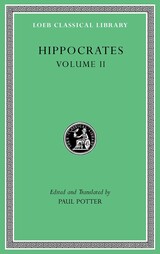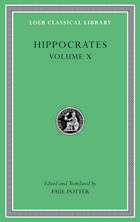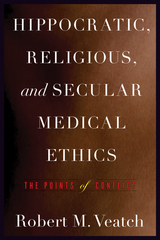
Hippocrates, said to have been born in Cos in or before 460 BCE, learned medicine and philosophy; travelled widely as a medical doctor and teacher; was consulted by King Perdiccas of Macedon and Artaxerxes of Persia; and died perhaps at Larissa. Apparently he rejected superstition in favour of inductive reasoning and the study of real medicine as subject to natural laws, in general and in individual people as patients for treatment by medicines and surgery. Of the roughly 70 works in the “Hippocratic Collection,” many are not by Hippocrates; even the famous oath may not be his. But he was undeniably the “Father of Medicine.”
The works available in the Loeb Classical Library edition of Hippocrates are:
Volume I: Ancient Medicine. Airs, Waters, Places. Epidemics 1 and 3. The Oath. Precepts. Nutriment.
Volume II: Prognostic. Regimen in Acute Diseases. The Sacred Disease. The Art. Breaths. Law. Decorum. Physician (Ch. 1). Dentition.
Volume III: On Wounds in the Head. In the Surgery. On Fractures. On Joints. Mochlicon.
Volume IV: Nature of Man. Regimen in Health. Humours. Aphorisms. Regimen 1–3. Dreams.
Volume V: Affections. Diseases 1–2.
Volume VI: Diseases 3. Internal Affections. Regimen in Acute Diseases.
Volume VII: Epidemics 2 and 4–7.
Volume VIII: Places in Man. Glands. Fleshes. Prorrhetic 1–2. Physician. Use of Liquids. Ulcers. Haemorrhoids and Fistulas.
Volume IX: Anatomy. Nature of Bones. Heart. Eight Months’ Child. Coan Prenotions. Crises. Critical Days. Superfetation. Girls. Excision of the Fetus. Sight.
Volume X: Generation. Nature of the Child. Diseases 4. Nature of Women. Barrenness.
Volume XI: Diseases of Women 1–2.
(Volume IV also contains the fragments of Heracleitus’ On the Universe.)

The definitive English edition of the “Father of Medicine.”
This is the first volume in the Loeb Classical Library’s complete edition of Hippocrates’ invaluable texts, which provide essential information about the practice of medicine in antiquity and about Greek theories concerning the human body. Here, Paul Potter presents the Greek text with facing English translation of five treatises that showcase the range of Hippocratic theory, philosophy, and practice: Ancient Medicine; Airs, Waters, Places; Epidemics 1 and 3; Precepts; and Nutriment. Also included is the famous Hippocratic Oath.
This Loeb edition replaces the original by W. H. S. Jones.
The works available in the Loeb Classical Library edition of Hippocrates are:
Volume I: Ancient Medicine. Airs, Waters, Places. Epidemics 1 and 3. The Oath. Precepts. Nutriment.
Volume II: Prognostic. Regimen in Acute Diseases. The Sacred Disease. The Art. Breaths. Law. Decorum. Dentition.
Volume III: On Wounds in the Head. In the Surgery. On Fractures. On Joints. Mochlicon.
Volume IV: Nature of Man. Regimen in Health. Humors. Aphorisms. Regimen 1–3. Dreams.
Volume V: Affections. Diseases 1–2.
Volume VI: Diseases 3. Internal Affections. Regimen in Acute Diseases.
Volume VII: Epidemics 2 and 4–7.
Volume VIII: Places in Man. Glands. Fleshes. Prorrhetic 1–2. Physician. Use of Liquids. Ulcers. Haemorrhoids and Fistulas.
Volume IX: Anatomy. Nature of Bones. Heart. Eight Months’ Child. Coan Prenotions. Crises. Critical Days. Superfetation. Girls. Excision of the Fetus. Sight.
Volume X: Generation. Nature of the Child. Diseases 4. Nature of Women. Barrenness.
Volume XI: Diseases of Women 1–2.

The definitive English edition of the “Father of Medicine.”
This is the second volume in the Loeb Classical Library’s complete edition of Hippocrates’ invaluable texts, which provide essential information about the practice of medicine in antiquity and about Greek theories concerning the human body. The first two treatises, Prognostic and Regimen in Acute Diseases, are manuals respectively on how to predict the course and outcome of acute diseases and how to apply appropriate dietetic measures. Sacred Disease, The Art, and Breaths are rhetorically polished monographs, each arguing in favor of a specific hypothesis: that sacred disease is a misnomer; that medicine is a legitimate art; and that air plays important roles in life and health. Law sketches a new model of medical education; Decorum summarizes a public address on the components of medical wisdom; and Dentition collects pediatric aphorisms dealing mainly with the nursing of infants and ulcerations of their tonsils, uvula, and throat.
This Loeb edition replaces the original by W. H. S. Jones.
The works available in the Loeb Classical Library edition of Hippocrates are:
Volume I: Ancient Medicine. Airs, Waters, Places. Epidemics 1 and 3. The Oath. Precepts. Nutriment.
Volume II: Prognostic. Regimen in Acute Diseases. The Sacred Disease. The Art. Breaths. Law. Decorum. Dentition.
Volume III: On Wounds in the Head. In the Surgery. On Fractures. On Joints. Mochlicon.
Volume IV: Nature of Man. Regimen in Health. Humors. Aphorisms. Regimen 1–3. Dreams.
Volume V: Affections. Diseases 1–2.
Volume VI: Diseases 3. Internal Affections. Regimen in Acute Diseases.
Volume VII: Epidemics 2 and 4–7.
Volume VIII: Places in Man. Glands. Fleshes. Prorrhetic 1–2. Physician. Use of Liquids. Ulcers. Haemorrhoids and Fistulas.
Volume IX: Anatomy. Nature of Bones. Heart. Eight Months’ Child. Coan Prenotions. Crises. Critical Days. Superfetation. Girls. Excision of the Fetus. Sight.
Volume X: Generation. Nature of the Child. Diseases 4. Nature of Women. Barrenness.
Volume XI: Diseases of Women 1–2.

The definitive English edition of the “Father of Medicine.”
Hippocrates, said to have been born in Cos in or before 460 BC, learned medicine and philosophy; traveled widely as a medical doctor and teacher; was consulted by King Perdiccas of Macedon and Artaxerxes of Persia; and died perhaps at Larissa. Apparently he rejected superstition in favor of inductive reasoning and the study of real medicine as subject to natural laws, in general and in individual people as patients for treatment by medicines and surgery. Of the roughly seventy works in the “Hippocratic Collection” many are not by Hippocrates; even the famous oath may not be his. But he was undeniably the “Father of Medicine.”
The works available in the Loeb Classical Library edition of Hippocrates are:
Volume I: Ancient Medicine. Airs, Waters, Places. Epidemics 1 and 3. The Oath. Precepts. Nutriment.
Volume II: Prognostic. Regimen in Acute Diseases. The Sacred Disease. The Art. Breaths. Law. Decorum. Dentition.
Volume III: On Wounds in the Head. In the Surgery. On Fractures. On Joints. Mochlicon.
Volume IV: Nature of Man. Regimen in Health. Humors. Aphorisms. Regimen 1–3. Dreams.
Volume V: Affections. Diseases 1–2.
Volume VI: Diseases 3. Internal Affections. Regimen in Acute Diseases.
Volume VII: Epidemics 2 and 4–7.
Volume VIII: Places in Man. Glands. Fleshes. Prorrhetic 1–2. Physician. Use of Liquids. Ulcers. Haemorrhoids and Fistulas.
Volume IX: Anatomy. Nature of Bones. Heart. Eight Months’ Child. Coan Prenotions. Crises. Critical Days. Superfetation. Girls. Excision of the Fetus. Sight.
Volume X: Generation. Nature of the Child. Diseases 4. Nature of Women. Barrenness.
Volume XI: Diseases of Women 1–2.

The definitive English edition of the “Father of Medicine.”
Hippocrates, said to have been born in Cos in or before 460 BC, learned medicine and philosophy; traveled widely as a medical doctor and teacher; was consulted by King Perdiccas of Macedon and Artaxerxes of Persia; and died perhaps at Larissa. Apparently he rejected superstition in favor of inductive reasoning and the study of real medicine as subject to natural laws, in general and in individual people as patients for treatment by medicines and surgery. Of the roughly seventy works in the “Hippocratic Collection” many are not by Hippocrates; even the famous oath may not be his. But he was undeniably the “Father of Medicine.”
The works available in the Loeb Classical Library edition of Hippocrates are:
Volume I: Ancient Medicine. Airs, Waters, Places. Epidemics 1 and 3. The Oath. Precepts. Nutriment.
Volume II: Prognostic. Regimen in Acute Diseases. The Sacred Disease. The Art. Breaths. Law. Decorum. Dentition.
Volume III: On Wounds in the Head. In the Surgery. On Fractures. On Joints. Mochlicon.
Volume IV: Nature of Man. Regimen in Health. Humors. Aphorisms. Regimen 1–3. Dreams.
Volume V: Affections. Diseases 1–2.
Volume VI: Diseases 3. Internal Affections. Regimen in Acute Diseases.
Volume VII: Epidemics 2 and 4–7.
Volume VIII: Places in Man. Glands. Fleshes. Prorrhetic 1–2. Physician. Use of Liquids. Ulcers. Haemorrhoids and Fistulas.
Volume IX: Anatomy. Nature of Bones. Heart. Eight Months’ Child. Coan Prenotions. Crises. Critical Days. Superfetation. Girls. Excision of the Fetus. Sight.
Volume X: Generation. Nature of the Child. Diseases 4. Nature of Women. Barrenness.
Volume XI: Diseases of Women 1–2.

The definitive English edition of the “Father of Medicine.”
This is the ninth volume in the Loeb Classical Library’s ongoing edition of Hippocrates’ invaluable texts, which provide essential information about the practice of medicine in antiquity and about Greek theories concerning the human body. Here Paul Potter presents the Greek text with facing English translation of eleven treatises, four previously unavailable in English, that illuminate Hippocratic medicine in such areas as anatomy, physiology, prognosis and clinical signs, obstetrics, and ophthalmology.
The works available in the Loeb Classical Library edition of Hippocrates are:
Volume I: Ancient Medicine. Airs, Waters, Places. Epidemics 1 and 3. The Oath. Precepts. Nutriment.
Volume II: Prognostic. Regimen in Acute Diseases. The Sacred Disease. The Art. Breaths. Law. Decorum. Dentition.
Volume III: On Wounds in the Head. In the Surgery. On Fractures. On Joints. Mochlicon.
Volume IV: Nature of Man. Regimen in Health. Humors. Aphorisms. Regimen 1–3. Dreams.
Volume V: Affections. Diseases 1–2.
Volume VI: Diseases 3. Internal Affections. Regimen in Acute Diseases.
Volume VII: Epidemics 2 and 4–7.
Volume VIII: Places in Man. Glands. Fleshes. Prorrhetic 1–2. Physician. Use of Liquids. Ulcers. Haemorrhoids and Fistulas.
Volume IX: Anatomy. Nature of Bones. Heart. Eight Months’ Child. Coan Prenotions. Crises. Critical Days. Superfetation. Girls. Excision of the Fetus. Sight.
Volume X: Generation. Nature of the Child. Diseases 4. Nature of Women. Barrenness.
Volume XI: Diseases of Women 1–2.

The definitive English edition of the “Father of Medicine.”
Hippocrates, said to have been born in Cos in or before 460 BC, learned medicine and philosophy; traveled widely as a medical doctor and teacher; was consulted by King Perdiccas of Macedon and Artaxerxes of Persia; and died perhaps at Larissa. Apparently he rejected superstition in favor of inductive reasoning and the study of real medicine as subject to natural laws, in general and in individual people as patients for treatment by medicines and surgery. Of the roughly seventy works in the “Hippocratic Collection” many are not by Hippocrates; even the famous oath may not be his. But he was undeniably the “Father of Medicine.”
The works available in the Loeb Classical Library edition of Hippocrates are:
Volume I: Ancient Medicine. Airs, Waters, Places. Epidemics 1 and 3. The Oath. Precepts. Nutriment.
Volume II: Prognostic. Regimen in Acute Diseases. The Sacred Disease. The Art. Breaths. Law. Decorum. Dentition.
Volume III: On Wounds in the Head. In the Surgery. On Fractures. On Joints. Mochlicon.
Volume IV: Nature of Man. Regimen in Health. Humors. Aphorisms. Regimen 1–3. Dreams.
Volume V: Affections. Diseases 1–2.
Volume VI: Diseases 3. Internal Affections. Regimen in Acute Diseases.
Volume VII: Epidemics 2 and 4–7.
Volume VIII: Places in Man. Glands. Fleshes. Prorrhetic 1–2. Physician. Use of Liquids. Ulcers. Haemorrhoids and Fistulas.
Volume IX: Anatomy. Nature of Bones. Heart. Eight Months’ Child. Coan Prenotions. Crises. Critical Days. Superfetation. Girls. Excision of the Fetus. Sight.
Volume X: Generation. Nature of the Child. Diseases 4. Nature of Women. Barrenness.
Volume XI: Diseases of Women 1–2.

The definitive English edition of the “Father of Medicine.”
Hippocrates, said to have been born in Cos in or before 460 BC, learned medicine and philosophy; traveled widely as a medical doctor and teacher; was consulted by King Perdiccas of Macedon and Artaxerxes of Persia; and died perhaps at Larissa. Apparently he rejected superstition in favor of inductive reasoning and the study of real medicine as subject to natural laws, in general and in individual people as patients for treatment by medicines and surgery. Of the roughly seventy works in the “Hippocratic Collection” many are not by Hippocrates; even the famous oath may not be his. But he was undeniably the “Father of Medicine.”
The works available in the Loeb Classical Library edition of Hippocrates are:
Volume I: Ancient Medicine. Airs, Waters, Places. Epidemics 1 and 3. The Oath. Precepts. Nutriment.
Volume II: Prognostic. Regimen in Acute Diseases. The Sacred Disease. The Art. Breaths. Law. Decorum. Dentition.
Volume III: On Wounds in the Head. In the Surgery. On Fractures. On Joints. Mochlicon.
Volume IV: Nature of Man. Regimen in Health. Humors. Aphorisms. Regimen 1–3. Dreams.
Volume V: Affections. Diseases 1–2.
Volume VI: Diseases 3. Internal Affections. Regimen in Acute Diseases.
Volume VII: Epidemics 2 and 4–7.
Volume VIII: Places in Man. Glands. Fleshes. Prorrhetic 1–2. Physician. Use of Liquids. Ulcers. Haemorrhoids and Fistulas.
Volume IX: Anatomy. Nature of Bones. Heart. Eight Months’ Child. Coan Prenotions. Crises. Critical Days. Superfetation. Girls. Excision of the Fetus. Sight.
Volume X: Generation. Nature of the Child. Diseases 4. Nature of Women. Barrenness.
Volume XI: Diseases of Women 1–2.

The definitive English edition of the “Father of Medicine.”
The medical treatises collected under Hippocrates’ name are essential sources of information about the practice of medicine in antiquity and about Greek theories concerning the human body. In this seventh volume of the ongoing Loeb edition of the Hippocratic Collection, Wesley Smith presents the first modern English translation of Books 2 and 4–7 of the Epidemics (the other two books are available in the first volume).
In the casebooks and notes that make up the seven books called Epidemics—the title originally meant ‘visits’—we can watch ancient physicians observing patients, noting and pondering symptoms, evaluating treatments, and developing theories about the body. They appear to be physicians’ notebooks from several areas of the Aegean basin. Smith supplements his clear translation with explanatory notes.
The works available in the Loeb Classical Library edition of Hippocrates are:
Volume I: Ancient Medicine. Airs, Waters, Places. Epidemics 1 and 3. The Oath. Precepts. Nutriment.
Volume II: Prognostic. Regimen in Acute Diseases. The Sacred Disease. The Art. Breaths. Law. Decorum. Dentition.
Volume III: On Wounds in the Head. In the Surgery. On Fractures. On Joints. Mochlicon.
Volume IV: Nature of Man. Regimen in Health. Humors. Aphorisms. Regimen 1–3. Dreams.
Volume V: Affections. Diseases 1–2.
Volume VI: Diseases 3. Internal Affections. Regimen in Acute Diseases.
Volume VII: Epidemics 2 and 4–7.
Volume VIII: Places in Man. Glands. Fleshes. Prorrhetic 1–2. Physician. Use of Liquids. Ulcers. Haemorrhoids and Fistulas.
Volume IX: Anatomy. Nature of Bones. Heart. Eight Months’ Child. Coan Prenotions. Crises. Critical Days. Superfetation. Girls. Excision of the Fetus. Sight.
Volume X: Generation. Nature of the Child. Diseases 4. Nature of Women. Barrenness.
Volume XI: Diseases of Women 1–2.

The definitive English edition of the “Father of Medicine.”
The medical treatises collected under Hippocrates’ name are essential sources of information about the practice of medicine in antiquity and about Greek theories concerning the human body. In this eighth volume of the ongoing Loeb edition of these invaluable texts, Paul Potter presents ten treatises that offer an illuminating overview of Hippocratic medicine.
Three theoretical works—Places in Man, General Nature of Glands, and Fleshes—expound particular theories of anatomy and physiology and then elaborate on how disease and healing occur in the systems depicted. Prorrhetic 1 and 2 and Physician deal with symptoms and prognosis and with other aspects of the physician-patient relationship. And four practical manuals—Use of Liquids, Ulcers, Fistulas, and Haemorrhoids—give specific instruction for treatments. Thus from the writings in this volume we gain insight into the Hippocratic physician’s understanding of the body, his approach to his patient, and his methods for dealing with a variety of disorders.
The works available in the Loeb Classical Library edition of Hippocrates are:
Volume I: Ancient Medicine. Airs, Waters, Places. Epidemics 1 and 3. The Oath. Precepts. Nutriment.
Volume II: Prognostic. Regimen in Acute Diseases. The Sacred Disease. The Art. Breaths. Law. Decorum. Dentition.
Volume III: On Wounds in the Head. In the Surgery. On Fractures. On Joints. Mochlicon.
Volume IV: Nature of Man. Regimen in Health. Humors. Aphorisms. Regimen 1–3. Dreams.
Volume V: Affections. Diseases 1–2.
Volume VI: Diseases 3. Internal Affections. Regimen in Acute Diseases.
Volume VII: Epidemics 2 and 4–7.
Volume VIII: Places in Man. Glands. Fleshes. Prorrhetic 1–2. Physician. Use of Liquids. Ulcers. Haemorrhoids and Fistulas.
Volume IX: Anatomy. Nature of Bones. Heart. Eight Months’ Child. Coan Prenotions. Crises. Critical Days. Superfetation. Girls. Excision of the Fetus. Sight.
Volume X: Generation. Nature of the Child. Diseases 4. Nature of Women. Barrenness.
Volume XI: Diseases of Women 1–2.

The definitive English edition of the “Father of Medicine.”
This is the tenth volume in the Loeb Classical Library’s ongoing edition of Hippocrates’ invaluable texts, which provide essential information about the practice of medicine in antiquity and about Greek theories concerning the human body. Here, Paul Potter presents the Greek text with facing English translation of five treatises, four concerning human reproduction (Generation, Nature of the Child) and reproductive disorders (Nature of Women, Barrenness), and one (Diseases 4) that expounds a general theory of physiology and pathology.
The works available in the Loeb Classical Library edition of Hippocrates are:
Volume I: Ancient Medicine. Airs, Waters, Places. Epidemics 1 and 3. The Oath. Precepts. Nutriment.
Volume II: Prognostic. Regimen in Acute Diseases. The Sacred Disease. The Art. Breaths. Law. Decorum. Dentition.
Volume III: On Wounds in the Head. In the Surgery. On Fractures. On Joints. Mochlicon.
Volume IV: Nature of Man. Regimen in Health. Humors. Aphorisms. Regimen 1–3. Dreams.
Volume V: Affections. Diseases 1–2.
Volume VI: Diseases 3. Internal Affections. Regimen in Acute Diseases.
Volume VII: Epidemics 2 and 4–7.
Volume VIII: Places in Man. Glands. Fleshes. Prorrhetic 1–2. Physician. Use of Liquids. Ulcers. Haemorrhoids and Fistulas.
Volume IX: Anatomy. Nature of Bones. Heart. Eight Months’ Child. Coan Prenotions. Crises. Critical Days. Superfetation. Girls. Excision of the Fetus. Sight.
Volume X: Generation. Nature of the Child. Diseases 4. Nature of Women. Barrenness.
Volume XI: Diseases of Women 1–2.

The definitive English edition of the “Father of Medicine.”
This is the eleventh and final volume in the Loeb Classical Library’s complete edition of Hippocrates’ invaluable texts, which provide essential information about the practice of medicine in antiquity and about Greek theories concerning the human body. Here, Paul Potter presents the Greek text with facing English translation of Diseases of Women 1 and 2, which represent the most extensive accounts in the Hippocratic collection of female reproductive life, the pathological conditions affecting the female reproductive organs, and their proper terminology and recommended treatments. A lexicon of therapeutic agents is included for reference.
The works available in the Loeb Classical Library edition of Hippocrates are:
Volume I: Ancient Medicine. Airs, Waters, Places. Epidemics 1 and 3. The Oath. Precepts. Nutriment.
Volume II: Prognostic. Regimen in Acute Diseases. The Sacred Disease. The Art. Breaths. Law. Decorum. Dentition.
Volume III: On Wounds in the Head. In the Surgery. On Fractures. On Joints. Mochlicon.
Volume IV: Nature of Man. Regimen in Health. Humors. Aphorisms. Regimen 1–3. Dreams.
Volume V: Affections. Diseases 1–2.
Volume VI: Diseases 3. Internal Affections. Regimen in Acute Diseases.
Volume VII: Epidemics 2 and 4–7.
Volume VIII: Places in Man. Glands. Fleshes. Prorrhetic 1–2. Physician. Use of Liquids. Ulcers. Haemorrhoids and Fistulas.
Volume IX: Anatomy. Nature of Bones. Heart. Eight Months’ Child. Coan Prenotions. Crises. Critical Days. Superfetation. Girls. Excision of the Fetus. Sight.
Volume X: Generation. Nature of the Child. Diseases 4. Nature of Women. Barrenness.
Volume XI: Diseases of Women 1–2.

Where should physicians get their ethics? Professional codes such as the Hippocratic Oath claim moral authority for those in a particular field, yet according to medical ethicist Robert Veatch, these codes have little or nothing to do with how members of a guild should understand morality or make ethical decisions. While the Hippocratic Oath continues to be cited by a wide array of professional associations, scholars, and medical students, Veatch contends that the pledge is such an offensive code of ethics that it should be summarily excised from the profession. What, then, should serve as a basis for medical morality?
Building on his recent contribution to the prestigious Gifford Lectures, Veatch challenges the presumption that professional groups have the authority to declare codes of ethics for their members. To the contrary, he contends that role-specific duties must be derived from ethical norms having their foundations outside the profession, in religious and secular convictions. Further, these ethical norms must be comprehensible to lay people and patients. Veatch argues that there are some moral norms shared by most human beings that reflect a common morality, and ultimately it is these generally agreed-upon religious and secular ways of knowing—thus far best exemplified by the 2005 Universal Declaration on Bioethics and Human Rights—that should underpin the morality of all patient-professional relations in the field of medicine.
Hippocratic, Religious, and Secular Medical Ethics is the magnum opus of one of the most distinguished medical ethicists of his generation.

Hippocrates, said to have been born in Cos in or before 460 BCE, learned medicine and philosophy; travelled widely as a medical doctor and teacher; was consulted by King Perdiccas of Macedon and Artaxerxes of Persia; and died perhaps at Larissa. Apparently he rejected superstition in favour of inductive reasoning and the study of real medicine as subject to natural laws, in general and in individual people as patients for treatment by medicines and surgery. Of the roughly 70 works in the 'Hippocratic Collection' many are not by Hippocrates; even the famous oath may not be his. But he was undeniably the 'Father of Medicine'.
The works available in the Loeb Classical Library edition of Hippocrates are the following. Volume I: Ancient Medicine. Airs, Waters, Places. Epidemics 1 and 3. The Oath. Precepts. Nutriment. Volume II: Prognostic. Regimen in Acute Diseases. The Sacred Disease. The Art. Breaths. Law. Decorum. Physician (Ch. 1). Dentition. Volume III: On Wounds in the Head. In the Surgery. On Fractures. On Joints. Mochlicon. Volume IV: Nature of Man. Regimen in Health. Humours. Aphorisms. Regimen 13. Dreams. Volume V: Affections. Diseases 12. Volume VI: Diseases 3. Internal Affections. Regimen in Acute Diseases. Volume VII: Epidemics 2 and 47. Volume VIII: Places in Man. Glands. Fleshes. Prorrhetic III. Physician. Use of Liquids. Ulcers. Haemorrhoids and Fistulas. Volume IV also contains the fragments of Heracleitus, On the Universe.
READERS
Browse our collection.
PUBLISHERS
See BiblioVault's publisher services.
STUDENT SERVICES
Files for college accessibility offices.
UChicago Accessibility Resources
home | accessibility | search | about | contact us
BiblioVault ® 2001 - 2025
The University of Chicago Press









